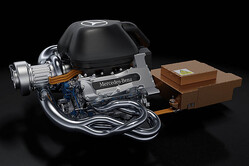


12/10/2014
NEWS STORY
 Mercedes looks unlikely to change its opposition to the engine unfreeze any time soon, and its rivals are not happy.
Mercedes looks unlikely to change its opposition to the engine unfreeze any time soon, and its rivals are not happy.
Under the current rules, in an attempt to limit spending, a certain amount of engine development can be carried out each year, manufacturers are allowed to change up to 48% of 45 components. However, these changes are only allowed once the season has ended and from 2015 will be scaled back further.
The 2014 units were homologated on February 28 and since then changes have only been allowed for reasons of safety, reliability or to cut costs.
Whilst Mercedes has enjoyed clear superiority, rivals Renault and Ferrari have struggled, and consequently are pushing for an unfreeze, allowing performance development in-season, and naturally the German manufacturer isn't happy.
Having initially agreed to the move, Mercedes is now against it and at a meeting of the Strategy Group in Sochi, it, Williams and Lotus, which will use the German manufacturer's units next season voted against the move.
For the move to be implemented, it will require the unanimous agreement from the F1 Commission and if Mercedes maintains its stance it would mean it could not be put before the FIA's world Motor Sport Council.
In the latest case of self-interest before all else to hit the sport, Christian Horner revealed his frustration, though one wonders how he might feel if the boot was on the other foot and Renault was the dominant power unit.
"In Singapore the teams unanimously agreed on a position and then, I think, subsequently from that meeting, Mercedes changed their position," he revealed at the Friday press conference. "We've subsequently had a strategy meeting and it's been voted on a majority basis for that to go through to the Formula One Commission for in-season upgrades to be allowed.
"We'll see what the outcome of the Formula Commission vote is," he added. "FIA are in support, FOM are in support. Obviously the non-Mercedes teams are in support - so we'll see what that holds in approximately a month's time."
"Thinking of frozen engines... this is not Formula One," added Marco Mattiacci. "So I agree with Christian, today we have the majority of the votes to move ahead on the idea to unfreeze the engine. Let's see what's going to happen during the F1 Commission."
Speaking later, Wolff dismissed claims that Mercedes position is about dominance and more about installing some form of stability in the sport, that and a means of controlling spending.
"We already voted against it in the Strategy Group and I don't think we will change our mind in the next month or whenever the meeting will take place," he said. "We have rules and we have governance, and the governance is in place in order to avoid quick, knee-jerk decisions being made that upset stability, upset the commercial setup and I strongly believe you cannot change rules in October for the following year just because you think they don't suit you.
"Because there is a governing process in place, the F1 Commission needs to vote on that anyway," he continued. And if the F1 Commission is not unanimous in that particular case for next year then that is absolutely right because you cannot vote for stuff three months before the new season starts. In no business does this go on. So, for 2016 we are going through an ordinary process, we are going to have a look at it again and then decide whether it is the right thing to do.
"We've looked at it because we wanted to take up the challenge and say 'OK, somebody wants to do in-season development, what's the in-season development? Let's take the challenge up'. But what does it mean as a consequence for the series itself? What does it mean commercially? How much does it cost? I think as a serious business you have to explore these costs and not just say 'why don't we do it?' So we need to explore those costs and also you need to look at what it means logistically."
In terms of costs, he added. "We are a team with three customers, including ourselves four customers, so whatever we do we need to be able to develop a power unit and deliver a power unit that is the same for everybody. It's different to Honda which has one customer only, it's different to Ferrari that has two customers and we don't know next year, and different for Renault again. All these things need careful evaluation, needs thorough analysis and assessment and then we can take a decision."